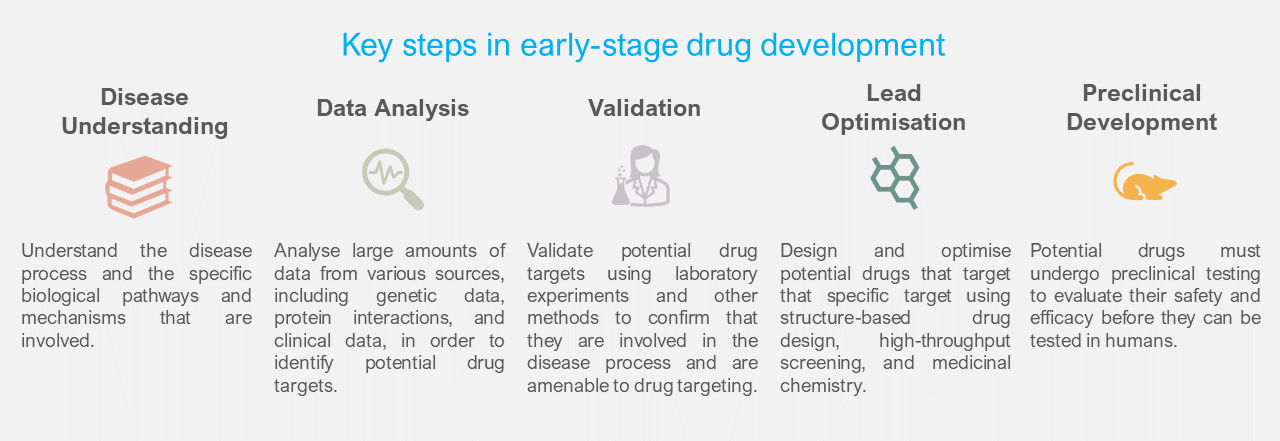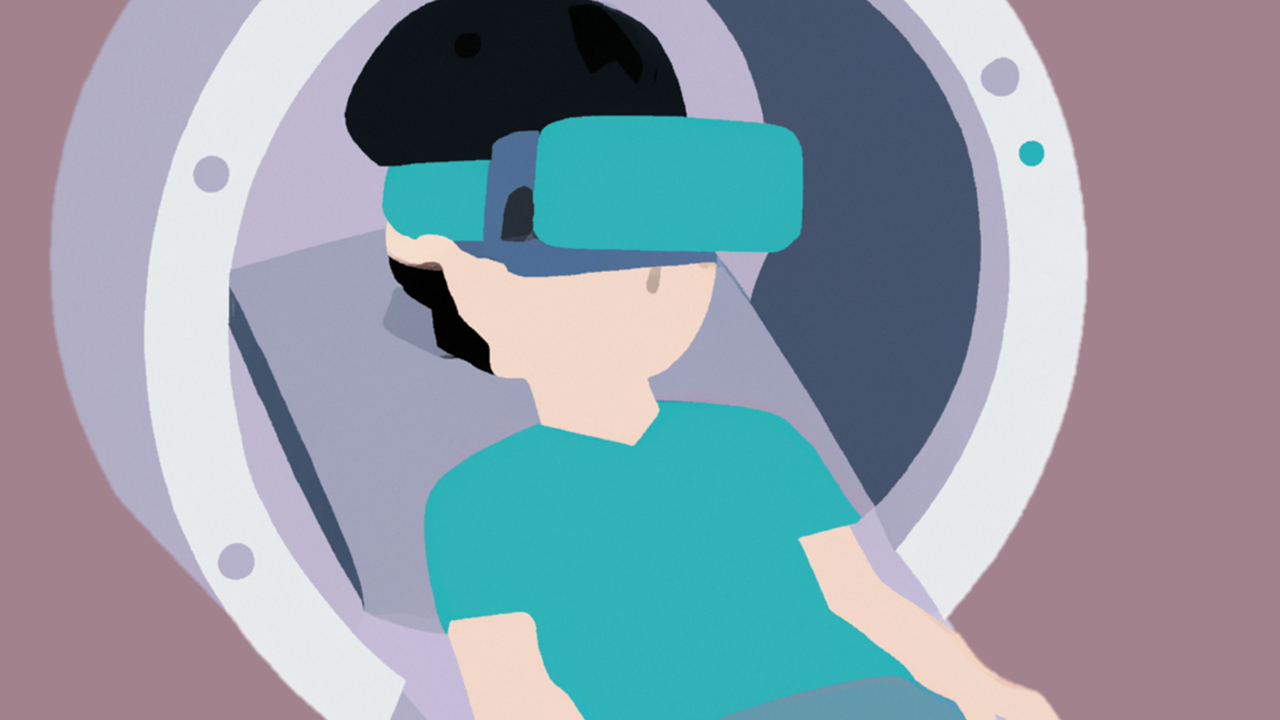Artificial intelligence (AI) is rapidly transforming the landscape of drug discovery and development, offering unparalleled opportunities to accelerate the development of new therapies and improve patient outcomes. The traditional drug discovery process can be a long and expensive journey, often taking up to a decade and costing billions of dollars. However, with the use of AI technologies, researchers can now analyse vast amounts of data, identify new drug targets, and predict drug efficacy with greater accuracy and speed than ever before. AI is revolutionising the way drugs are discovered, tested, and brought to market, and its impact is already being felt across the pharmaceutical industry.
In this article, we will explore how AI is changing drug discovery and development processes, the benefits it offers, and the obstacles that need to be addressed to ensure that this technology is used efficiently to advance human health.
AI’s Impact on Target Identification in Drug Discovery
Target identification is a crucial early stage in the drug development process, in which researchers identify a specific molecular target that is involved in the disease process and that could be targeted by a potential drug. The goal of target identification is to find a specific protein, gene, or other molecular entity that is critical to the disease process and that can be targeted by a drug in order to modify the disease.
The first step in target identification is to understand the disease process and the specific biological pathways and mechanisms that are involved. This requires a deep understanding of the underlying biology of the disease and the specific cells, tissues, and organs that are affected. Researchers then analyse large amounts of data from various sources, including genetic data, protein interactions, and clinical data, in order to identify potential drug targets. Once potential drug targets have been identified, they must be validated using laboratory experiments and other methods to confirm that they are involved in the disease process and are amenable to drug targeting. Once validated, researchers can begin to design and optimise potential drugs that target that specific target. This involves a range of activities, including structure-based drug design, high-throughput screening, and medicinal chemistry. Finally, potential drugs must undergo preclinical testing to evaluate their safety and efficacy before they can be tested in humans.
Traditionally, target identification has been a slow and laborious process that relies on a combination of laboratory experiments, genetic studies, and data analysis. However, the rise of AI and machine learning is revolutionising this process, providing researchers with new tools to identify potential drug targets more quickly and accurately.
There are a number of AI startups that are using AI for target identification in drug discovery. BenevolentAI, a UK-based company which has increased their number of AI patents significantly in recent years, is using AI to analyse vast amounts of biomedical data in order to identify potential drug targets. The company’s platform uses machine learning algorithms to integrate diverse data sources, such as genetic data and scientific literature, to identify potential targets for further investigation. Insitro, one of the most funded startups in AI drug development, is using machine learning algorithms to model the biological processes that underlie disease, with the aim of identifying new drug targets. The company’s platform combines data from a range of sources, including genetics, clinical data, and imaging data, to build predictive models of disease. Recursion Pharmaceuticals, a company founded a decade ago and recently went public with its IPO in 2021, is leveraging AI to identify potential drug targets for rare diseases. The company’s platform uses machine learning algorithms to screen large numbers of compounds and identify those with the most potential as drugs. Atomwise, another US-based company, is using AI to identify potential drug targets by predicting the structures of proteins. The company’s platform uses deep learning algorithms to analyse genetic data and predict the structures of proteins, which can then be used to identify potential drug targets.
Exploring the Role of AI in Streamlining Screening Processes
Once a potential drug target has been identified and validated, a thorough screening process is taking place to identify those molecules with the most potential as new drugs. Traditional methods of drug discovery rely on brute-force screening of vast libraries of compounds, a time-consuming and resource-intensive process that can take years to produce a single lead compound. By leveraging AI, drug discovery companies are now able to streamline the screening process and identify promising candidates more quickly.
Using AI to analyse vast amounts of data on molecular structure and predicting which molecules are most likely to interact with specific targets, researchers can focus their efforts on the compounds with the highest potential, and thereby reduce the number of experiments needed to identify promising lead compounds. By predicting how a molecule will behave in the human body, including factors like absorption, distribution, metabolism, and excretion (ADME), researchers are now able to efficiently identify molecules with the greatest potential for efficacy and safety to optimise drug dosing and formulation.
One example of a company using AI in molecule screening is Atomwise. They are developing an AI platform that can analyse molecular structures and predict their potential as drugs. Atomwise’s platform uses deep learning algorithms to analyse millions of potential drug candidates and identify the most promising compounds. The company has already used its technology to identify new drug candidates for a range of diseases, including Ebola, multiple sclerosis, and cystic fibrosis.
Overcoming Obstacles in the Application of AI for Early-Stage Drug Discovery
Integrating AI into drug development processes is a complex undertaking due to the well-established methods, traditions, and structures within the pharmaceutical industry that have been in place for many years. The transformation of these established systems can present a considerable challenge, and there are numerous obstacles that must be overcome to effectively incorporate AI technologies.
One significant challenge associated with integrating AI into drug development processes is the availability and quality of data. Although pharmaceutical companies generate vast amounts of data during drug development, this data is not always easily accessible, and its quality can vary widely. For example, data may be fragmented across different sources or may be of poor quality due to issues such as missing data points or errors.
Furthermore, AI algorithms rely heavily on data to learn and make accurate predictions, so the quality and quantity of data available for analysis can significantly impact the performance of these algorithms. In drug development, this means that poor quality data can lead to inaccurate predictions or incorrect conclusions, which can ultimately result in wasted time and resources.
To overcome this challenge, pharmaceutical companies need to invest in data management and integration technologies to ensure that data is appropriately stored, organised, and cleaned. Additionally, collaborations between industry partners and academic institutions should be fostered to access a broader range of high-quality data. These efforts will help ensure that AI algorithms have access to the data they need to make accurate predictions and accelerate the drug development process.
Interpretability is another major obstacle in getting AI developed drugs to market. Interpretability refers to the ability to understand how an AI model generates its predictions. In many cases, AI models are designed to maximise their predictive accuracy, which may result in models that are difficult to interpret. In drug development, this can be problematic, as it is essential to understand the underlying biological mechanisms and interactions that lead to the predicted outcomes. For example, if an AI model predicts that a particular compound will be effective against a certain disease, it is critical to understand how the model arrived at that prediction and which biological pathways or targets are involved.
Efforts are underway to develop more interpretable AI models, such as those based on decision trees or rule-based systems. Additionally, AI explainability techniques, such as model-agnostic methods or local interpretable model-agnostic explanations, can be used to provide insight into how black-box models arrive at their predictions. While there is still much work to be done in this area, improving the interpretability of AI models in drug development is crucial for advancing the field and bringing new drugs to market.
The complexity of integrating AI into drug development processes requires a multi-disciplinary approach that involves collaboration among multiple stakeholders with diverse expertise. This includes researchers, data scientists, software engineers, domain experts, regulatory agencies, and clinicians, among others. Each stakeholder brings their own unique perspective and expertise to the table, and the interplay between them is critical for success.
The Challenge of Integrating AI in Traditional Pharmaceutical Companies
Pharmaceutical companies are among the largest corporations in the world and are deeply entrenched in a culture of cost-conscious risk aversion. Their established cultures, methods, and traditions are critical to their survival in a highly competitive, multibillion-dollar industry, enabling them to produce pharmaceuticals at low costs.
However, AI-enabled drug discovery requires a different set of skills and expertise than traditional drug development. Risk tolerance, innovation, technology, and a remarkable focus on data integration, is what enables AI startups to succeed in AI drug discovery. And this creates a cultural mismatch that makes it challenging for pharmaceutical companies to embrace and fully integrate AI into their drug discovery process.
To overcome these challenges, pharmaceutical companies are increasingly turning to early-stage discovery startups and contract research organisations (CROs) that specialise in AI-powered drug discovery. By partnering with these startups and CROs, pharmaceutical companies can gain access to AI expertise and infrastructure without having to make significant investments in data science and computational biology capabilities. Moreover, working with startups and CROs allows pharmaceutical companies to overcome cultural barriers and benefit from their more agile and entrepreneurial approach to drug discovery.
While the emerging trend of working closely with early-stage discovery startups and CROs may seem like a temporary solution, it is likely here to stay in the foreseeable future. By partnering with early-stage discovery startups and CROs, pharmaceutical companies can leverage the benefits of AI without disrupting their traditional drug development process. As the technology for fully automated AI-powered drug discovery improves, the cultural barriers will inevitably disappear, and integrating the technology into big pharma drug development will become a logical and compelling next step.
Related Market Report
Emersion Insights is pleased to offer our “AI in Drug Development Market Report” which provides a comprehensive analysis of the AI drug development industry.
Using a meticulous bottom-up revenue analysis approach, we have accurately measured the current market size and projected market growth until 2030. Our report also includes highly segmented market forecasts, giving investors and innovators a clear understanding of the specific sub-markets and their respective growth potential. Furthermore, we have conducted an in-depth analysis of market shares, identifying the key players and their market positioning. This information allows stakeholders to make informed decisions about investment opportunities, potential partnerships and business strategy.
If you’re looking for detailed insights into the AI drug development and discovery market, our report is an essential resource. Please reach out for more information.





